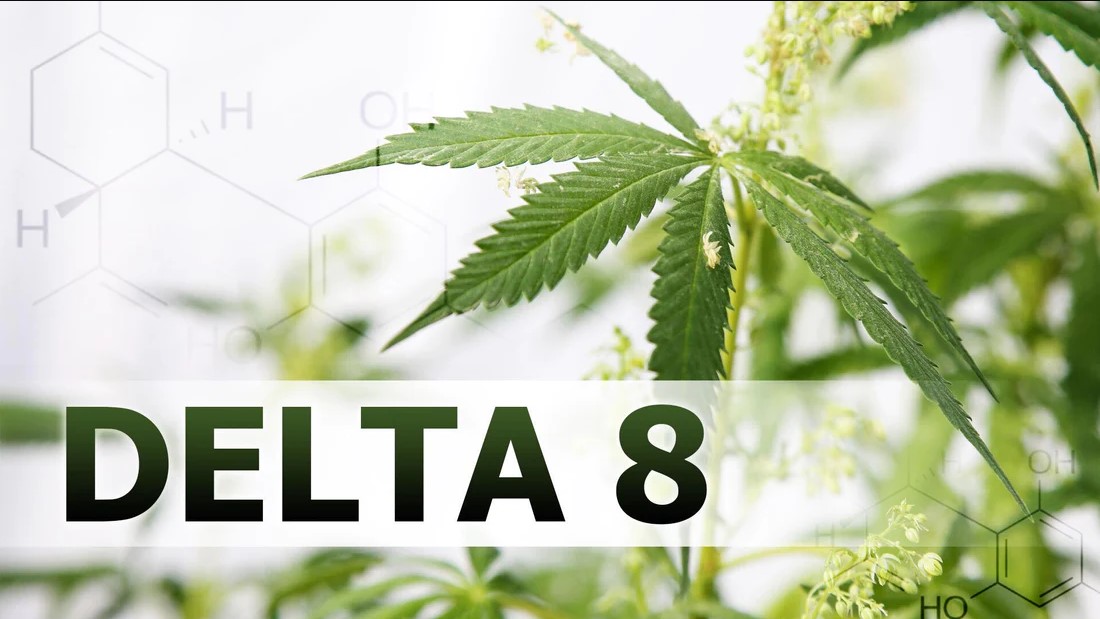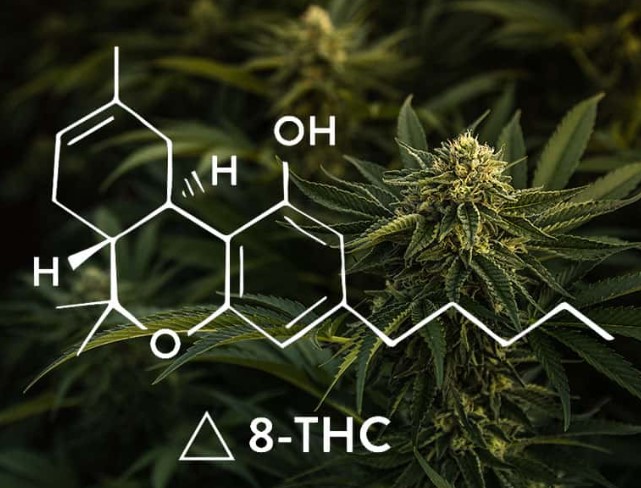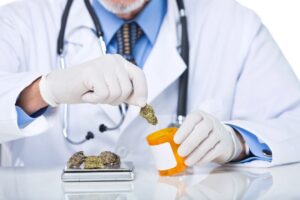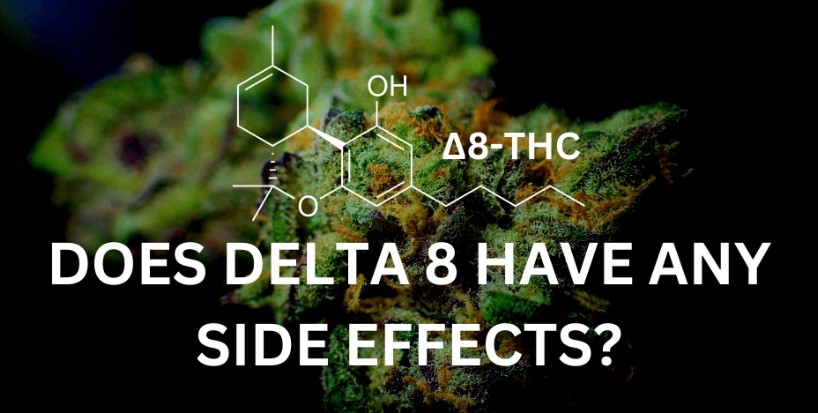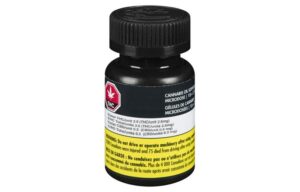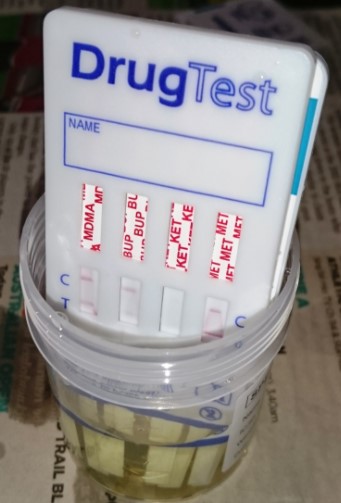Delta-8 THC, also known as delta-8 tetrahydrocannabinol, is a naturally occurring chemical compound found in trace amounts in hemp and cannabis plants. It is classified as a cannabinoid and has gained popularity in recent years due to its various uses and potential benefits. In this article, we will explore the different aspects of delta-8 THC, including its effects, potential therapeutic uses, and the risks associated with its consumption.
Table of Contents:
What is Delta-8 THC?(Δ8 THC)
Delta-8 THC, scientifically termed delta-8 tetrahydrocannabinol, is a cannabinoid found in hemp and cannabis plants. What sets it apart molecularly is a nuanced difference from its close relative, delta-9 THC—the position of a double bond in its molecular chain. In delta-8 THC, this bond is located on the 8th carbon atom, resulting in a unique structural configuration.
This molecular distinction translates into a milder psychoactive experience when compared to delta-9 THC. Delta-8 THC interacts primarily with CB-1 receptors in the endocannabinoid system. The positioning of the double bond influences how it binds to these receptors, initiating a cascade of effects that mirror those of naturally occurring endocannabinoids. This distinctive interaction accounts for the subdued psychoactive impact of delta-8 THC, offering consumers a gentler high and a reduced likelihood of side effects such as paranoia and anxiety.
In essence, delta-8 THC is a cannabinoid with a molecular structure that sets it apart, delivering a distinctive psychoactive experience. It appeals to individuals seeking a milder alternative within the spectrum of cannabis compounds, often described as “marijuana lite” or “diet weed.”
Δ8 THC vs. CBD
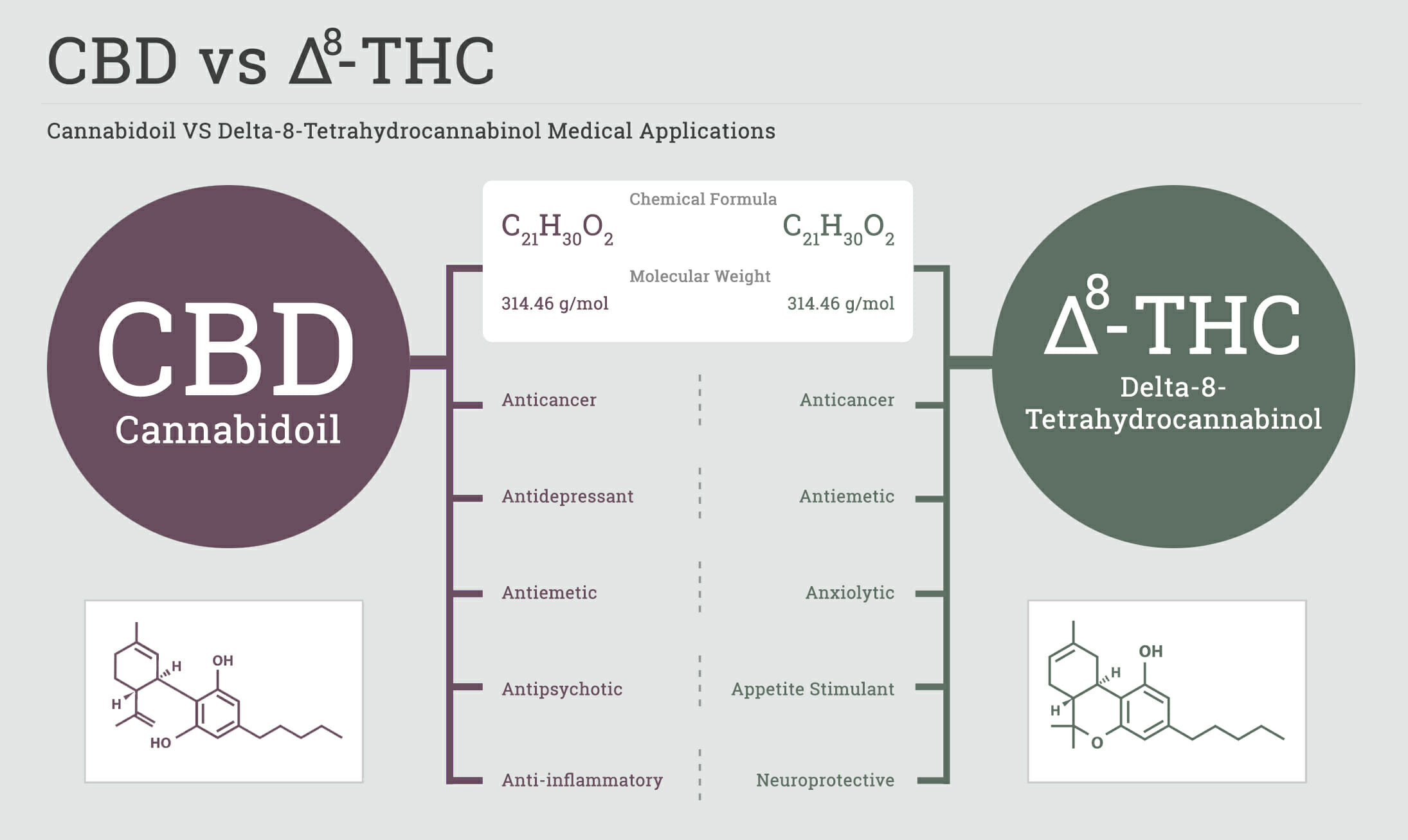
While both delta-8 THC and CBD can be derived from hemp or marijuana plants, they have distinct effects. CBD does not cause a high and is being studied for its potential therapeutic uses, including anxiety, diabetes, multiple sclerosis, Parkinson’s disease, and schizophrenia. While research on Delta-8 THC is still in its early stages, there is a growing body of evidence suggesting potential therapeutic uses and benefits.
How Does Delta-8 THC Work?
Δ8 THC, or delta-8-tetrahydrocannabinol, is a psychoactive cannabinoid found in trace amounts in the cannabis plant. It shares structural similarities with the more well-known delta-9 THC, the primary psychoactive compound in cannabis. The way delta-8 THC works in the body is intricately tied to its interaction with the endocannabinoid system (ECS), a complex cell-signaling system involved in regulating various physiological processes.
Interaction with Cannabinoid Receptors:
Δ8 THC primarily exerts its effects by binding to the cannabinoid receptors found in the body. The two main types of cannabinoid receptors are CB1 and CB2. CB1 receptors are predominantly located in the central nervous system, including the brain, while CB2 receptors are more abundant in the peripheral tissues, especially in the immune system.
Affinity for CB1 Receptors:
Δ8 THC has a partial affinity for CB1 receptors, particularly in the central nervous system. When it binds to these receptors, it modulates the release of neurotransmitters. This interaction is responsible for the psychoactive effects associated with delta-8 THC, albeit generally reported to be less intense than those of delta-9 THC.
Neurotransmitter Modulation:
By binding to CB1 receptors, delta-8 THC influences the release of neurotransmitters such as dopamine and serotonin. This modulation contributes to the compound’s effects on mood, appetite, and other cognitive functions. The specific impact may vary from person to person.
Activation of the Endocannabinoid System:
The endocannabinoid system plays a crucial role in maintaining homeostasis in the body. Delta-8 THC, by interacting with cannabinoid receptors, mimics the action of endocannabinoids, which are naturally occurring compounds in the body. This interaction may influence a range of physiological functions, including immune response, inflammation, and pain perception.
Distinct from Delta-9 THC:
While delta-8 THC shares similarities with delta-9 THC, it has a different chemical structure due to the placement of a double bond in its molecular chain. This subtle difference may contribute to variations in the way the two compounds interact with the endocannabinoid system, resulting in potentially distinct effects and a milder psychoactive experience with delta-8 THC.
Uses and Potential Benefits of Delta-8 THC
While research on Delta-8 THC is still in its early stages, there is a growing body of evidence suggesting potential therapeutic uses and benefits.
1. Anti-Cancer Potential of Delta-8 THC
Δ8 THC has emerged as a subject of interest in cancer research due to its potential anti-tumor properties. Studies suggest that the cannabinoid may inhibit the growth of cancer cells by interacting with CB1 receptors in the endocannabinoid system. This interaction plays a role in regulating cell growth and apoptosis, indicating a potential avenue for anti-cancer treatment.
2. Antiemetic Properties of Delta-8 THC
Promising results have been observed regarding the use of Δ8 THC as an antiemetic, particularly in managing nausea and vomiting associated with chemotherapy. The compound’s ability to alleviate these side effects may contribute significantly to improving the quality of life for individuals undergoing cancer treatment.
3. Anxiolytic Effects of Delta-8 THC
Δ8 THC demonstrates anxiolytic properties, suggesting its potential in reducing anxiety. Through interaction with both CB1 and CB2 receptors in the central nervous system, Δ8 THC modulates neurotransmitter release. This makes it a candidate for individuals dealing with anxiety disorders or stress-related conditions.
4. Appetite Stimulation with Delta-8 THC
Research indicates that Delta-8 THC may act as an appetite stimulant by interacting with CB1 receptors in the brain, which play a role in regulating food intake. This property holds promise for individuals experiencing appetite loss, such as those undergoing chemotherapy, presenting potential benefits for nutritional support during medical treatments.
5. Neuroprotective Potential of Delta-8 THC
Δ8 THC is being explored for its neuroprotective properties, showing promise in protecting brain cells from damage and inflammation. This aspect of Δ8 THC makes it a potential candidate for addressing neurodegenerative conditions, including but not limited to Alzheimer’s disease and other disorders affecting the nervous system.
While these findings are encouraging, it’s crucial to emphasize that further comprehensive research and clinical trials are essential to validate the safety and efficacy of Δ8 THC for medical purposes. Individuals considering its use should consult healthcare professionals for personalized advice and guidance.
Risks and Side Effects of Delta-8 THC
While delta-8 THC is generally considered to be less potent and have milder psychoactive effects than its cousin, delta-9 THC, it is important to be aware of potential risks and side effects associated with its use. As with any substance, individual responses can vary, and factors such as dosage, frequency of use, and individual health conditions can influence the likelihood and severity of adverse effects. Here are some potential risks and side effects of delta-8 THC:
Psychoactive Effects:
Delta-8 THC is psychoactive, and its consumption can lead to altered perception, mood changes, and impaired coordination. While these effects are generally reported to be less intense than those of delta-9 THC, individuals sensitive to psychoactive substances may still experience discomfort.
Dry Mouth and Eyes:
Like delta-9 THC, delta-8 THC can cause common cannabis-related side effects such as dry mouth (cottonmouth) and dry eyes. Staying hydrated and using eye drops may help alleviate these symptoms.
Increased Heart Rate:
Delta-8 THC, like delta-9 THC, may cause an increase in heart rate. Individuals with cardiovascular issues or a history of heart problems should exercise caution, as this effect could potentially be problematic for certain individuals.
Anxiety and Paranoia:
While delta-8 THC has anxiolytic properties for some users, others may experience heightened anxiety or paranoia, especially at higher doses. Individuals prone to anxiety disorders should approach delta-8 THC use with caution.
Drug Testing:
Delta-8 THC can result in a positive drug test for THC, as standard drug tests typically detect the presence of THC metabolites. This can be a concern for individuals subject to drug testing, as even small amounts of delta-8 THC can trigger a positive result.
Impaired Cognitive Function:
Excessive consumption of delta-8 THC may lead to impaired cognitive function, affecting memory, attention, and decision-making abilities. This can be particularly problematic for tasks that require focus and concentration.
Interactions with Medications:
Delta-8 THC may interact with certain medications. Individuals taking prescription medications should consult with their healthcare provider before using delta-8 THC to avoid potential interactions.
Lack of Regulation:
The delta-8 THC market is not as regulated as that of prescription medications. This lack of oversight means there may be variations in product quality and purity, with some products potentially containing contaminants or inaccurately labeled concentrations.
Dependency and Addiction:
Regular and heavy use of delta-8 THC, like any psychoactive substance, can potentially lead to dependency or addiction in susceptible individuals. While the risk may be lower than with delta-9 THC, it is still a consideration.
It’s crucial for individuals to approach delta-8 THC use responsibly and be aware of their own tolerance levels and health conditions. Consulting with healthcare professionals, especially for those with pre-existing medical conditions or those taking medications, is advisable to ensure safe and informed use. If someone experiences adverse effects, discontinuation of use and seeking medical advice is recommended.
Consumption Methods
Δ8 THC can be consumed through various methods, similar to other cannabinoids. The choice of consumption method can impact the onset time, duration of effects, and overall experience. Here are some common methods of consuming delta-8 THC:
Inhalation:
Vaping: Δ8 THC can be vaporized using a vape pen or vaporizer. Vaping allows for quick absorption through the lungs, leading to rapid onset of effects. It is a popular method for those seeking a fast-acting experience.
Smoking: Like traditional cannabis flower, delta-8 THC can be smoked in the form of pre-rolls or joints. Smoking provides a relatively fast onset of effects, but it may involve the inhalation of combusted plant material, which can be a concern for some users.
Oral Consumption:
Edibles: Δ8 THC is commonly infused into various edible products, such as gummies, chocolates, and baked goods. Edibles take longer to produce effects compared to inhalation (often 30 minutes to 2 hours), but the effects tend to last longer. Users should be cautious with dosing, as the onset can be delayed, and the intensity of effects may be stronger.
Sublingual Administration:
Tinctures: Δ8 THC tinctures are liquid extracts that can be administered sublingually (under the tongue). This method allows for relatively fast absorption through the mucous membranes, providing a quicker onset than traditional edibles.
Topical Application:
Creams and Balms: Some products contain delta-8 THC for topical application. These are not intended for systemic absorption but are applied to the skin for localized relief. They are commonly used for targeting specific areas of discomfort without producing psychoactive effects.
Capsules:
Encapsulated Form: Δ8 THC can be encapsulated into pill or capsule form. This method offers precise dosing and avoids the need for inhalation or sublingual administration. Effects may take longer to onset, similar to traditional edibles.
Dabbing:
Δ8 THC Concentrates: Similar to delta-9 THC concentrates, delta-8 THC concentrates can be used for dabbing. Dabbing involves vaporizing a concentrated form of delta-8 THC using a dab rig. This method provides a rapid onset of effects.
It’s important for users to consider their preferences, desired effects, and the speed of onset when choosing a consumption method. Additionally, individuals should be mindful of dosing, especially with edibles, as the effects can be more potent and longer-lasting compared to inhalation. As with any cannabinoid, responsible and informed use is key, and users should be aware of their own tolerance levels and potential sensitivities. If uncertain, consulting with healthcare professionals can provide personalized guidance on the most suitable consumption method based on individual health considerations.
Legal Status
The legal status of delta-8 THC varies across different jurisdictions. In some states, it is legal to purchase and use delta-8 THC products, while in others, it may be restricted or banned. The legality of delta-8 THC stems from the federal farm bill, which removed hemp and its derivatives from the list of controlled substances. However, the specific status of delta-8 THC may not be explicitly mentioned in the legislation, leading to varying interpretations and regulations at the state level. It is crucial to be aware of the laws regarding delta-8 THC in your area before buying or using these products.
The legal status of delta-8 THC in Canada falls under the Cannabis Act. Δ8 THC derived from hemp is generally legal, but it is subject to strict regulations. Cannabis, including its derivatives, is tightly regulated, and only authorized producers are allowed to manufacture and distribute cannabis products. Delta-8 THC derived from marijuana is subject to the same regulations as other cannabis products.
Safety and Quality Control
One of the concerns surrounding delta-8 THC is the lack of regulation and quality control. The production of delta-8 THC products involves chemical processes that are not regulated by the FDA. This means that these products may not undergo testing for safety or quality, and harmful chemicals could be present or formed during the manufacturing process. It is advisable to purchase Δ8 THC products from reputable sources that provide transparency regarding their production methods and third-party testing.
Drug Testing and Delta-8 THC
Drug testing for cannabis typically focuses on the detection of THC (tetrahydrocannabinol) and its metabolites in the body. Delta-8 THC, being a structural analogue of delta-9 THC, can also be detected in standard drug tests that are designed to identify THC metabolites. Here are some important points to consider regarding drug testing and delta-8 THC:
Similar Metabolites:
Δ8 THC is metabolized in the body into compounds that are similar to the metabolites of delta-9 THC. Standard drug tests often look for the presence of these metabolites, such as THC-COOH, in urine, blood, or saliva.
Potential for Positive Tests:
Δ8 THC use can result in a positive drug test for THC. This is important to note, especially for individuals subject to drug testing in situations such as employment, legal matters, or athletic competitions.
Variable Testing Sensitivity:
The sensitivity of drug tests can vary, and some tests may be more or less likely to detect delta-8 THC compared to delta-9 THC. Factors such as the specific test used, the threshold for a positive result, and individual metabolism can influence the likelihood of detection.
False Positives:
Some standard drug tests may not distinguish between different THC isomers or cannabinoids, potentially leading to false positives. Confirmation tests using more sophisticated methods can help distinguish between delta-8 THC and delta-9 THC.
Legal Delta-9 THC Limits:
In some jurisdictions, the legal limit for THC in hemp-derived products is set at 0.3% delta-9 THC on a dry weight basis. Δ8 THC can be present in hemp-derived products, but its concentration may also contribute to the overall THC content, potentially leading to legal issues.
Disclosure with Testing Authorities:
Individuals subject to drug testing should be aware that some tests might not differentiate between delta-8 THC and delta-9 THC. It’s advisable to disclose the use of any cannabis-derived products, including those containing delta-8 THC, to testing authorities.
Consultation with Professionals:
If concerns about drug testing arise, individuals should seek advice from legal and healthcare professionals. They can provide guidance on navigating the potential implications of delta-8 THC use in relation to drug testing.
In summary, while Δ8 THC may be less potent and produce milder psychoactive effects compared to delta-9 THC, it can still be detected in standard drug tests designed to identify THC and its metabolites. Individuals subject to drug testing should exercise caution, be aware of the specific regulations in their jurisdiction, and consider consulting with professionals for personalized guidance.
Conclusion
Delta-8 THC is a cannabinoid found in cannabis plants, offering a milder high compared to delta-9 THC. While it is gaining popularity and is legally available in some states, there are potential risks associated with its consumption. Limited research is available on the therapeutic uses and long-term effects of delta-8 THC, and it is essential to exercise caution and consult with a healthcare professional before using these products. Additionally, it is crucial to be aware of the legal status of delta-8 THC in your jurisdiction and to purchase from reputable sources that prioritize safety and quality control.
Note: The information provided in this article is for informational purposes only and should not be considered medical or legal advice. Always consult with a healthcare professional or legal expert before using delta-8 THC or any cannabis-related products.

